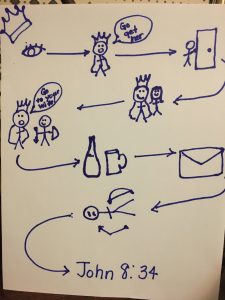My husband, Glenn, is sharing these daily lessons for our West Huntsville family as we are necessarily (because of the virus) spending less time physically together in worship, study and fellowship. We may be “socially distanced,” but we’re a close-knit family and we want to keep it that way! One way to stay on track together, spiritually, is to think about a common passage and make applications for our lives together even when we are unable to assemble as frequently. I’m sharing these daily family lessons here for those in other places, whose families (or even congregations) might benefit from a common study in these uncommon days of semi-quarantine. There are Family Bible Time guides included, as well. You can adapt, shorten or lengthen them according to the ages of kids (and adults) in your family. Blessings.
From Glenn:
My Favorite Proverbs: The importance of kindness to animals.
 “A righteous man regards the life of his animal, but the tender mercies of the wicked are cruel” (Prov. 12:16).
“A righteous man regards the life of his animal, but the tender mercies of the wicked are cruel” (Prov. 12:16).
The World Animal Protection organization is in London and is a strong advocate for the humane treatment of animals, but the better known organization in the US is PETA, People For the Ethical Treatment of Animals. A quick glance at their website will raise most Christians’ eyebrows. The lead headline is “Animals are not ours to experiment on, eat, wear, use for entertainment, or abuse in any other way.” The site asserts that animals and people are no different, and that the word “others” in the Golden Rule (Matt. 7:12) applies to animals and humans alike. Bible believers know that these folks have failed to consult the Word. The Creator of animals, it seems to me, ought to get a say in these matters:
“Then God said, “Let Us make man in Our image, according to Our likeness; let them have dominion over the fish of the sea, over the birds of the air, and over the cattle, over all the earth and over every creeping thing that creeps on the earth” (Gen. 1:26).
“So God blessed Noah and his sons, and said to them: “Be fruitful and multiply, and fill the earth. And the fear of you and the dread of you shall be on every beast of the earth, on every bird of the air, on all that move on the earth, and on all the fish of the sea. They are given into your hand. Every moving thing that lives shall be food for you. I have given you all things, even as the green herbs” (Gen. 9:1-3).
“Now John himself was clothed in camel’s hair, with a leather belt around his waist; and his food was locusts and wild honey” (Matt. 3:4).
Scripture often seems to answer questions it anticipates being asked in the future. The Proverbs writer warns against cruelty to animals in our text today, but on the same page, Proverbs 12:27, says, “The lazy man does not roast what he took in hunting, but diligence is man’s precious possession.” Solomon obviously didn’t consider hunting, killing, and eating animals to be cruelty.
But that doesn’t mean this Proverb teaches nothing important. Using animals for clothing, food, transportation, and companionship is not cruel, but abusing them without regard for their pain is cruelty. Furthermore, I doubt you’ll find a man who thus abuses animals and also treats humans as he should. There is a connection in there somewhere. One of the ways we teach our children to be gentle with other children is to teach them to be gentle with puppies.
It may very well be that God’s prohibition against abusing animals is less about the animals and more about what such abuse says about us.
Bible Time with Glenn and Cindy:
 Review the events about David and Bathsheba with your kids.
Review the events about David and Bathsheba with your kids.
Tonight’s lesson is from 2 Samuel 11:25:
Then David said to the messenger, “Thus you shall say to Joab: ‘Do not let this thing displease you, for the sword devours one as well as another. Strengthen your attack against the city, and overthrow it.’ So encourage him.”
I. Read and explain the verse to your kids. Notice with the kids how that David also wanted to encourage Joab to not worry about the horrible sin they’d committed. Have them see that people often think it will make them feel better about their own sin if they can try to make other people feel better about doing wrong. Sin makes sort of a “club” for “Let’s make each other feel better about this bad thing we are doing.” Talk with your kids about a list of things we might say to help each other “feel better” about sin.
- “People do this all the time.” (That’s what Joab was saying when he mentioned Abimelech.)
- “This is not as bad as what some people do.” (People who are social drinkers talk about how they are not drunkards. People who dress immodestly often point out that what they wear is a lot better than what ___________ wears. For small children, it might be that “I sometimes get a checkmark by my name at school for misbehavior, but I never get five checkmarks like ________does.”
- No one will ever know.” (For your teens, perhaps talk about pornography addictions. For younger children, maybe something like when they hide a mess and pretend they cleaned it up. I’m sure you can think of applicable things in your specific case.)
- “God will forgive us later, when it’s a good time to do the right thing.” (If you’re talking with teens, talk about premarital sex. Almost always, premarital sex, committed with intentions to marry later, never does even end in marriage; it ends in regret. Even if it does end in marriage, it still ends in regret, for God’s people, because it is sin.)
- “We can always make different choices later, if this turns out wrong.” Let’s just live our best life now. ( A good example is Abraham lying about Sarah. He thought it was so temporary. [Gen.12 and Gen. 20]. Another example is when couples move in together or marry and say “Let’s try this and see how it works out.”)
- People still look up to us. We are doing a lot of things right.” (Solomon must have thought this when he was the richest man in all the world and yet was idolatrous.)
- “We can’t confess this. It would hurt our influence.” (Joseph’s brothers lived the consequence of their treatment of Joseph and the deceit that followed for many years. After all, their family was prominent in their community.)
- “It’s okay. We are just going through a hard time right now.” (People who may cheat on their income taxes or take things that do not belong to them are examples of this rationalizing.)
- “I know it was wrong, but we did it to help someone else.” (Example: When people lie in order to make someone happy.)
- “I know this is against what the Bible says, but I just think God wants me to be happy.” (Example: When people marry people to whom they have no right.
Talk about each one of these things and see if your children can think of examples of people today, or people in Scripture, who may be thinking/ have thought this way. Obviously, you will have to adjust this conversation to fit the maturity levels of your children. You may want to omit some of the points for very young children. I included some examples for possible discussion above.
The point of tonight’s lesson is that people can think of a good “reason” to do any bad thing that they want to do. They can also make it seem like it’s not so bad after they do it and they can comfort each other into thinking it’s not so bad. Try to remind your children of this throughout the day tomorrow when they may make excuses for disobedience or argue about what you tell them to do. There’s never a good reason to do the wrong thing or to disobey.
II. Also, notice with your children that it’s easier to do the wrong thing when someone is helping you. People who disobey God love to get other people to do it with them. Joab and David encouraged each other to do the wrong thing. They were a “sin team” led by David. Ask your children if they have ever had someone who tried to get them to be on their sin team. “Has anyone ever tried to get you to do the wrong thing with them?”
Quote the KidSing rule.
Pray with your children.

 Examples are Geppetto being hurt in the story of Pinocchio or how Cinderella is hurt by the wicked stepmother and by the stepsisters or how Snow White is hurt by the wicked Queen. (It’s interesting to tell older kids that the name Geppetto means “Jehovah has added.” It’s a Hebrew name.) Choose one of these stories to read tonight and have the kids listen for someone who’s innocent being hurt by someone wicked. Sin hurts other people. (If you have both teens and younger ones, have the older ones read to the younger ones. But stick around for helping with applications.)
Examples are Geppetto being hurt in the story of Pinocchio or how Cinderella is hurt by the wicked stepmother and by the stepsisters or how Snow White is hurt by the wicked Queen. (It’s interesting to tell older kids that the name Geppetto means “Jehovah has added.” It’s a Hebrew name.) Choose one of these stories to read tonight and have the kids listen for someone who’s innocent being hurt by someone wicked. Sin hurts other people. (If you have both teens and younger ones, have the older ones read to the younger ones. But stick around for helping with applications.) When you get to the verse read it and elicit, from your kids, ways that we become slaves to sin. Was David a sort of slave to sin?
When you get to the verse read it and elicit, from your kids, ways that we become slaves to sin. Was David a sort of slave to sin?